
AI 工作流程平台 正在通过自动化任务、提高效率和降低成本来实现业务转型。本文重点介绍了六种深受美国企业信赖的领先解决方案,每种解决方案在集成、安全性、定价和可扩展性方面都具有独特的优势。
关键平台:
快速外卖:
每个平台都能满足特定的业务需求。无论您是扩大人工智能投资、自动化流程还是集成工具,这些解决方案都为更智能的工作流程提供了基础。
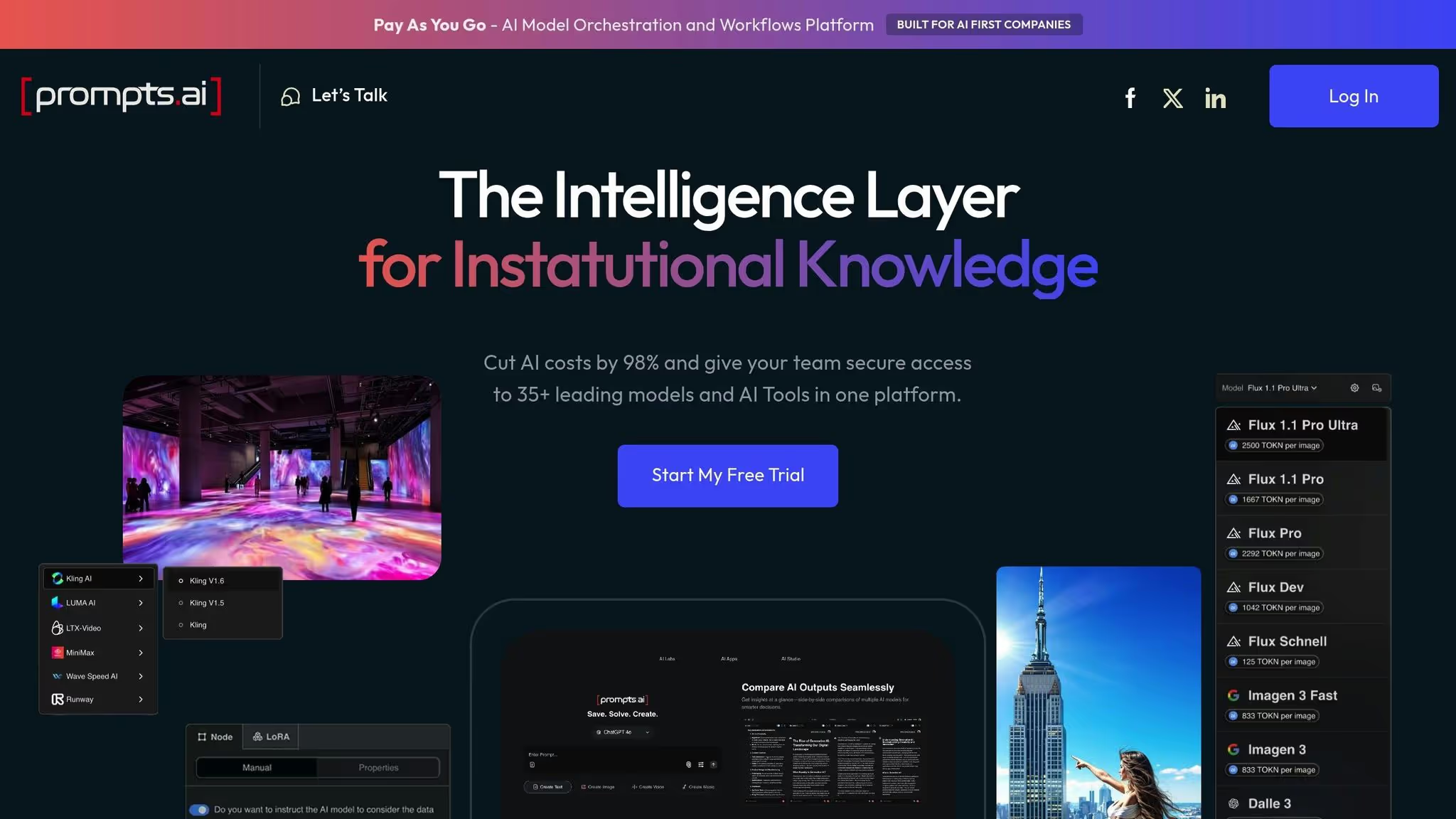
Prompts.ai 汇集了超过 35 个顶级 AI 模型,包括 GPT-5、Claude、 美洲驼,以及 双子座 -整合到一个安全的平台中。通过解决管理多个人工智能工具的挑战,它可以帮助美国企业节省大量成本并提高运营效率。
该平台对工作流程自动化的关注源于 即时工程 和 自然语言接口,使技术专家和非技术用户均可使用。这使组织能够设计、测试和部署复杂的多步骤人工智能代理,而无需丰富的编码专业知识。公司可以简化复杂的业务流程,同时对每一次人工智能互动保持完全控制和可见性。
Prompts.ai 因其通过强大的集成选项连接不同业务系统的能力而脱颖而出。支持以下内容 脚本集成,技术团队可以灵活地自定义工作流程以满足其特定需求。该平台还提供与预建连接器、webhook 支持和自定义选项的 API 集成,确保与现有企业软件的兼容性。
例如,一家总部位于美国的金融服务公司使用 Prompts.ai 来整合其 CRM、文档管理和合规工具。这简化了他们的客户入职流程,将其从五天缩短到不到24小时,同时将手动错误减少了90%。
除了集成功能外,Prompts.ai 还在其设计的各个方面都优先考虑安全性。
Prompts.ai 采用了严格的安全措施和治理实践,确保所有工作流程的数据保护。该平台符合以下标准 SOC 2 类型 II, 你好,以及 GDPR,为合规性提供了坚实的基础。自 2025 年 6 月 19 日起,Prompts.ai 开始了 SOC 2 II 类审计流程,并与 万塔 用于实时合规监控,确保对安全控制的持续监督。
组织可以通过以下方式访问详细的安全信息 Prompts.ai 信任中心 (https://trust.prompts.ai/),它提供平台的安全状态、政策和合规进展的实时更新。诸如此类的功能 基于角色的访问控制 和 数据加密 (传输中的和静止的)为敏感的业务数据增加了额外的保护层。
这种强大的安全框架与透明的成本管理方法相结合,详情如下。
Prompts.ai 的基于使用量的定价模式可节省 70— 85% 与传统的每次操作定价或基于座位的定价相比。这个 即用即付代币积分系统 消除了经常性订阅费,使成本与实际使用量保持一致。这意味着企业只需按实际用量付费,从而避免不必要的开支。
通过实时成本控制,组织可以监控每枚代币的支出,确保人工智能投资直接促进可衡量的业务成果。该平台的账单仪表板提供详细的使用情况报告,无任何隐性费用,从而实现准确的费用预测和预算。例如,上述金融服务公司省了钱 每年 120,000 美元 通过自动化工作流程和减少手动处理。
Prompts.ai 的基于云的基础设施可确保业务增长时的高性能和适应性。其集中式管理工具允许组织在不中断运营的情况下通过添加用户、团队和人工智能模型来快速扩展。诸如此类的功能 无限的工作空间, 无限的合作者,以及 代币池 使企业可以轻松地从小型团队扩展到企业级运营。
此外,该平台的 可视化工作流程生成器 和 AI 代码副驾驶 简化部署,减少启动自动化项目所需的时间和专业知识。这使组织无需深入的技术知识即可更轻松地扩展其人工智能计划并扩大其影响力。
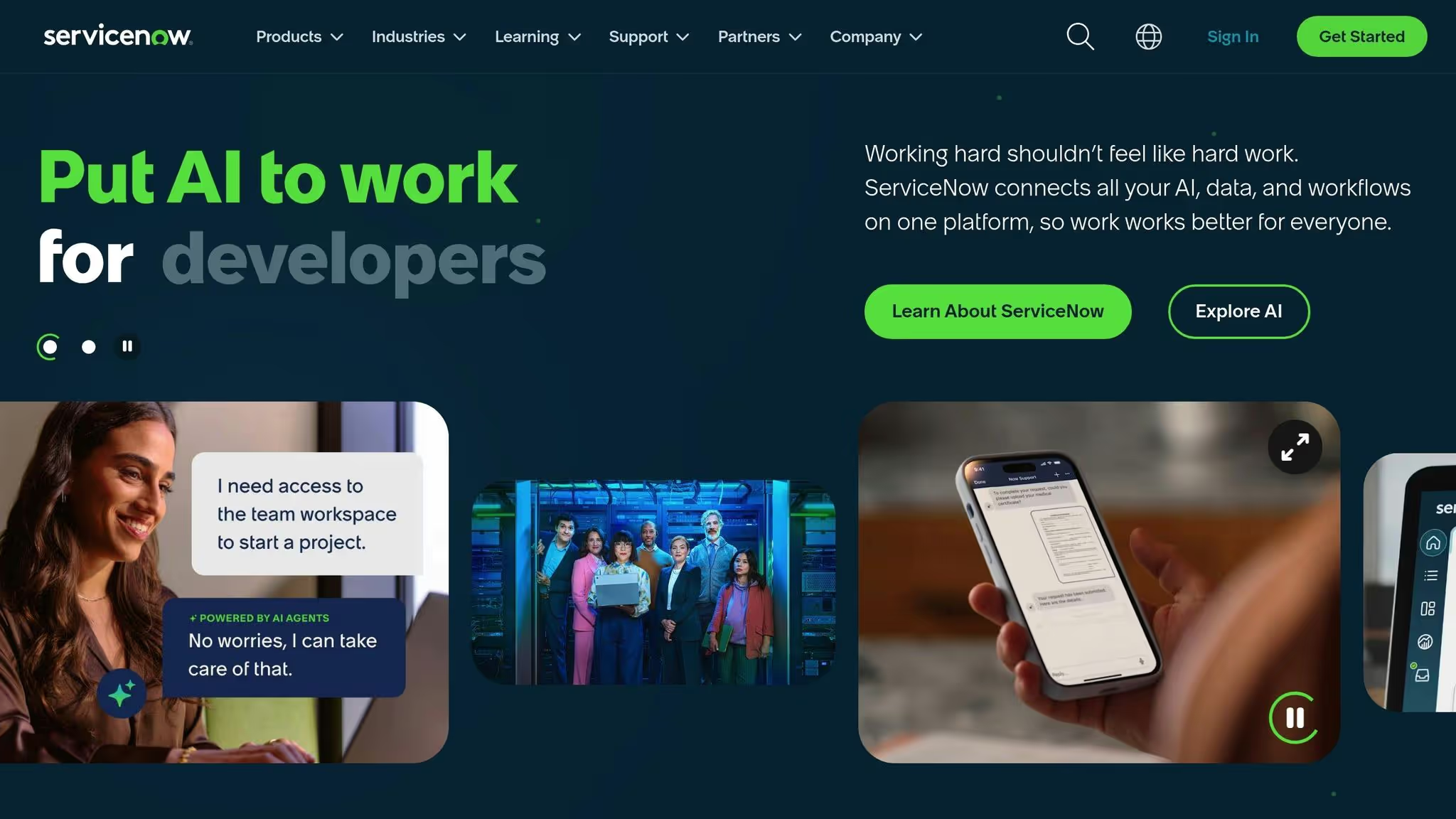
在我们继续探索领先的人工智能工作流程解决方案的过程中,ServiceNow以其量身定制的自动化脱颖而出,旨在满足企业IT及其他方面的需求。ServiceNow 的 Now 平台以其 IT 服务管理和业务流程自动化功能而闻名,它通过以下方式整合 AI 现在情报,使企业能够自动化IT、人力资源、客户服务和安全运营等部门错综复杂的工作流程。
通过将各种业务职能整合到统一的记录系统中,ServiceNow 消除了孤岛。其人工智能驱动的工作流程简化了事件管理和员工入职等任务,使其成为具有复杂运营需求的大型企业的首选解决方案。
ServiceNow 擅长通过其连接不同的企业系统 集成中心,它提供了超过1,000个与广泛使用的应用程序的预建集成,例如 销售部队, 微软办公软件 365, AWS, SAP,以及 神谕。它还支持 REST API、SOAP Web 服务和 MID 服务器等技术,确保与云和本地系统的无缝集成。
这种灵活性使组织能够增加其现有的 IT 投资,同时扩展自动化功能。该平台的 流程设计师 进一步使用户无需编码专业知识即可创建自动化工作流程。使用直观的可视化界面,团队可以设计跨越多个系统和部门的复杂流程。这样可以确保数据流畅流动、遵守治理协议和简化审批流程,同时保持强大的安全性。
ServiceNow 通过以下认证优先考虑企业级安全 SOC 2 类型 II, ISO 27001,以及 FedRAMP。其平台包括全面的审计记录和变更管理功能,可简化对法规的遵守,例如 你好, GDPR,以及 SOX。
这个 安全运营 模块将威胁情报和事件响应集成到自动化工作流程中,使团队能够快速响应安全事件。通过缩短解决问题的平均时间和保留详细的文档,组织可以在保持合规性的同时高效地应对威胁。
为了保护敏感数据,ServiceNow 采用了 基于角色的访问控制 和 数据加密。这些措施确保用户仅访问与其角色相关的数据和职能,同时提供所采取行动的全面可见性,从而确保全面问责制。
ServiceNow 采用基于订阅的定价模式,提供等级,例如 初学者, 专业的,以及 企业 版本。这种可扩展性允许组织选择符合其特定需求的计划。尽管详细定价尚未公开,但该平台通过运营效率而不是直接节省成本来强调价值。企业通常通过减少人工劳动、加快事件解决和提高员工工作效率来实现回报。
借助强大的分析和报告工具,ServiceNow 使组织能够衡量自动化计划的影响。仪表板跟踪指标,例如 解决问题的平均时间, 首次通话解决率,以及 员工满意度分数,为该平台的商业价值提供了清晰的见解。
ServiceNow 建立在云原生架构之上,支持各种规模的组织,从中端市场公司到具有以下特点的企业 成千上万的用户。其多实例设置允许单独的开发、测试和生产环境,同时保持一致的安全和治理。
该平台的 应用程序引擎 为创建自定义应用程序和工作流程提供了低代码环境,使企业能够在不牺牲性能或可扩展性的情况下应对独特的挑战。
ServiceNow 还提供 全球商业服务 以支持大规模实施。拥有合作伙伴网络,包括 埃森哲, 德勤,以及 IBM 公司,组织可以获得专业知识,将自动化工作扩展到多个单位和地点。这确保了随着企业的发展,他们的自动化策略可以随之扩展。
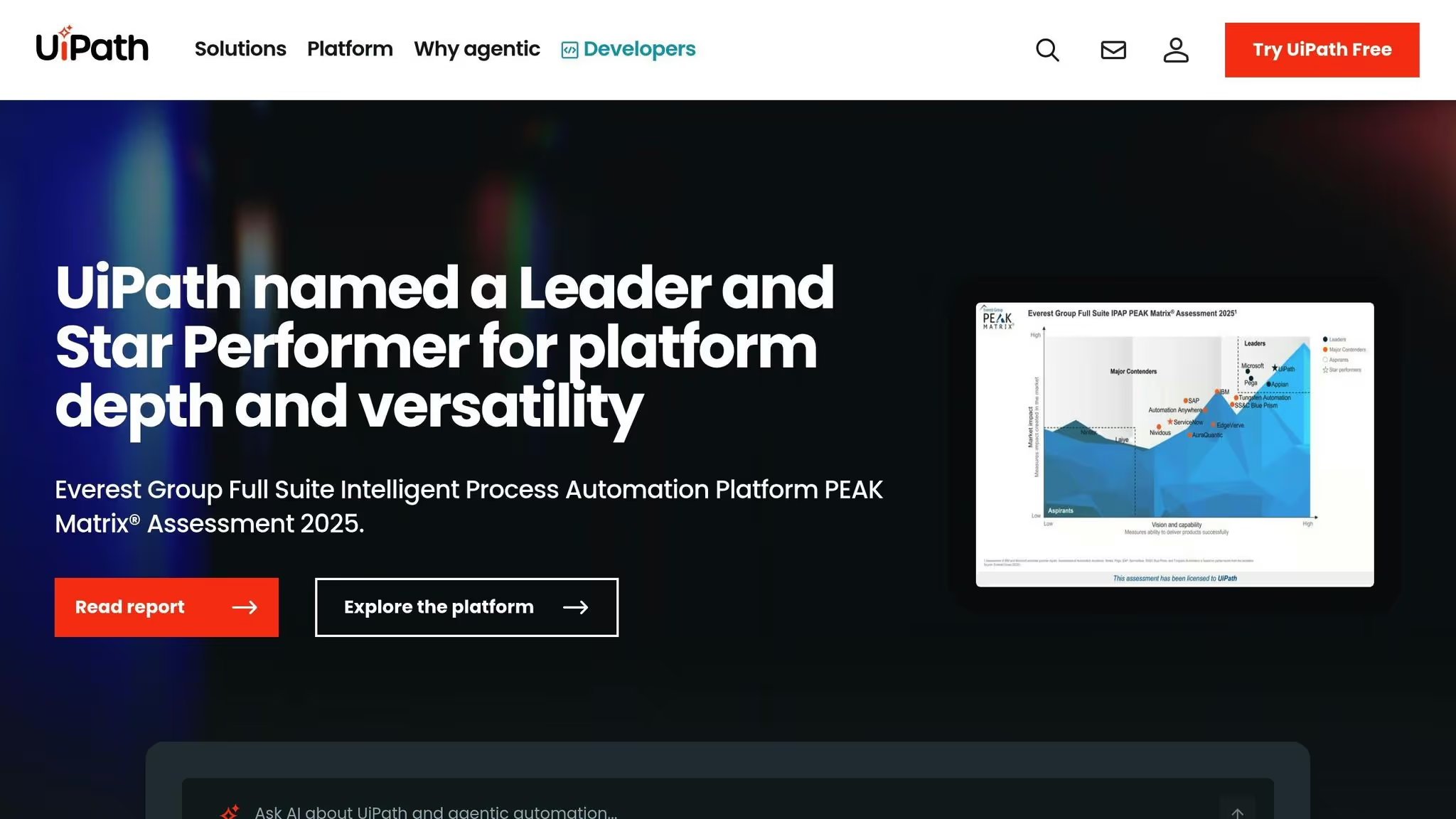
UiPath 通过将 RPA 机器人、人工智能模型和人工监督整合到一个统一的系统中,在机器人流程自动化 (RPA) 和智能工作流程管理领域脱颖而出。其 Orchestrator 平台简化了文档处理、任务路由和创建自我修复工作流程等任务。同时,AI Fabric 为团队提供工具,使他们能够根据情境做出决策,并使其与特定的业务规则保持一致。UiPath 专为与现有基础设施的无缝集成而设计,可确保平稳运行和适应性,以满足成长型企业的需求。这种集成级别使其成为管理复杂运营挑战的可靠选择。
UiPath 专为处理错综复杂的多层工作流程而打造。根据UiPath的一份报告,有52%的企业认为这些复杂流程的自动化——通常需要跨多个系统进行协调——是代理人工智能的关键优势。
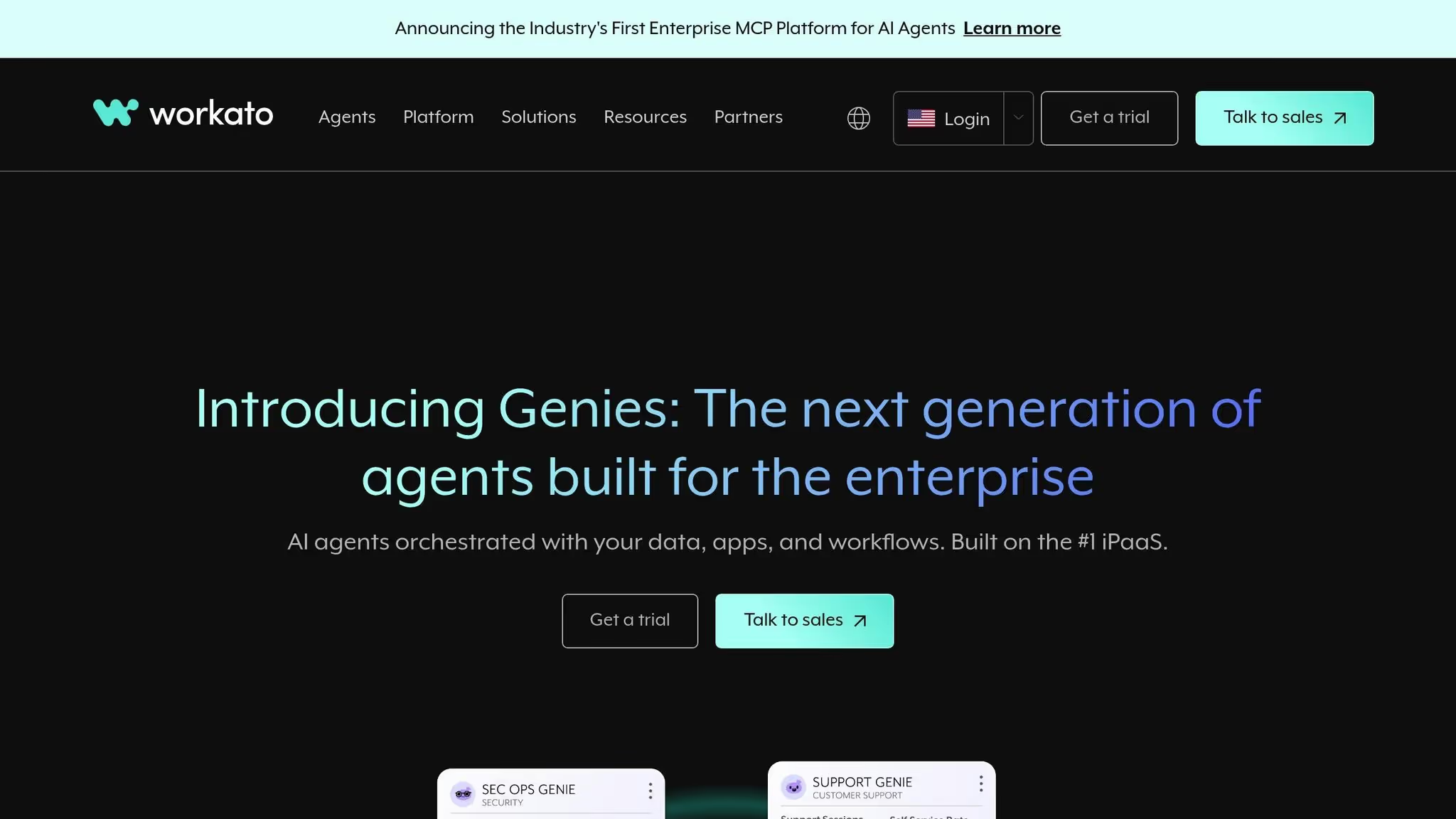
Workato 将集成功能与人工智能驱动的工作流程自动化相结合,以处理复杂的多系统流程。作为强大的集成平台即服务 (iPaaS),它提供集中控制,同时管理各种业务应用程序的复杂工作流程。
Workato 功能结束了 1,200 个预建连接器 和加速器,可在众多系统和应用程序上实现快速、可扩展的自动化。这些现成的 “食谱” 模板解决了Salesforce、NetSuite和Slack等流行平台上的常见工作流程,使团队可以更轻松地将业务规则、人工智能驱动的决策和跨应用程序操作无缝关联起来。
Workato因其能够创建超越简单数据交换的集成而脱颖而出。该平台支持高级逻辑和多层工作流程,确保连接反映现实世界的业务流程。对于需要跨越多个部门和应用程序的工作流程的组织来说,此功能尤其有价值。
它的优势在于充当应用程序到应用程序集成的集中中心,使其在涉及不同系统协同工作的场景中特别有效。
Workato 整合了一系列治理功能,例如基于角色的访问控制 (RBAC)、多环境支持和全面的审计跟踪。这些措施确保在工作流程的整个生命周期中对其进行安全和可控的管理。
该平台的RBAC框架,结合生命周期管理工具和多环境功能,增强了流程每个阶段的安全性和合规性。
Workato 以企业需求为出发点,旨在管理复杂的工作流程和处理大量数据。其架构支持集成架构师和自动化负责人构建安全、跨职能的工作流程,这些工作流程可以随着组织增长而扩展。
Workato 对与多个系统交互的 IT、财务和人力资源流程特别有效。它能够在扩展各种企业应用程序的同时保持性能,这使其成为组织扩展其自动化计划的可靠选择。
Workato 采用仅限企业的定价模式,详细信息可应要求提供。这种方法与其侧重于为需要量身定制的解决方案和专门支持以满足其复杂集成需求的大型企业提供服务相一致。
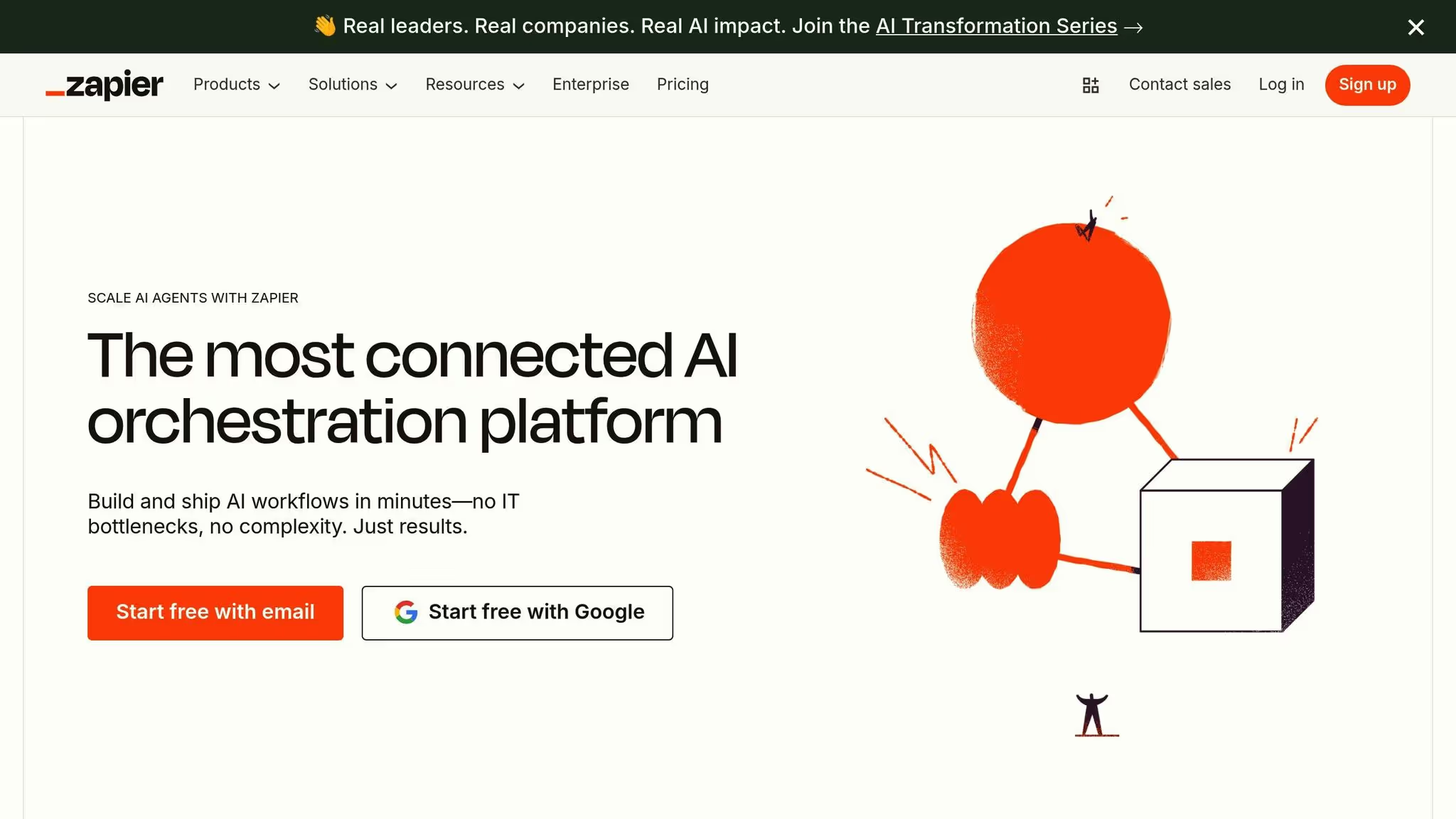
Zapier是一个无代码自动化平台,它通过名为 “Zaps” 的简单工作流程连接各种Web应用程序。这些工作流程围绕触发器和操作构建,使非技术用户可以轻松地自动化任务并简化不同应用程序之间的流程。通过专注于简单性和可访问性,Zapier使用户无需编程技能即可创建可扩展的、以任务为导向的自动化。
Zapier因其广泛的互操作性而脱颖而出,可连接数千个应用程序。虽然单个 Zap 通常遵循基本的触发和动作结构,但该平台支持更高级的多步 Zaps。这些允许用户将多个操作链接到单个触发器。例如,当新的潜在客户被添加到CRM时,Zapier可以同时将联系人添加到电子邮件列表,在项目管理工具中创建任务,并在聊天应用程序中发送通知——所有这些都在一个工作流程中完成。
但是,这些集成的深度在很大程度上取决于每个互联应用程序提供的 API。与专为企业级集成设计的平台相比,这种对 API 功能的依赖可能会限制数据处理的复杂性。
Zapier的可扩展性围绕其任务驱动的模型展开,在该模型中,工作流程中的每个操作都算作一项任务。该平台能够通过自动处理速率限制和错误来管理高任务量。由于支持多步 Zap 和条件逻辑,用户可以设计更复杂的工作流程。尽管这种方法适用于许多中小型企业,但自动化需求异常高的组织应评估与Zapier基于任务的定价相关的潜在成本。
Zapier的定价非常简单,其等级基于每月任务使用量和功能访问权限。免费计划包括有限数量的任务,而付费计划可解锁其他功能,例如多步Zaps,高级应用程序集成和高级自动化工具。基于任务的定价模型使用户可以更轻松地根据活动水平估算成本,并且该平台提供详细的分析以帮助有效监控任务使用情况。
Zapier 通过强有力的措施将安全放在首位,例如传输期间和静态数据加密、定期安全审计以及 SOC 2 II 类合规性。数据通常在工作流程执行期间临时处理,除非另有配置,否则不会永久存储。更高级别的计划包括单点登录 (SSO)、集中管理控制、详细的活动日志和审计跟踪等功能,以支持遵守GDPR和CCPA等法规。对于敏感信息,Zapier提供了数据保留控制和自定义处理政策选项,为组织提供了有效满足严格监管要求的工具。
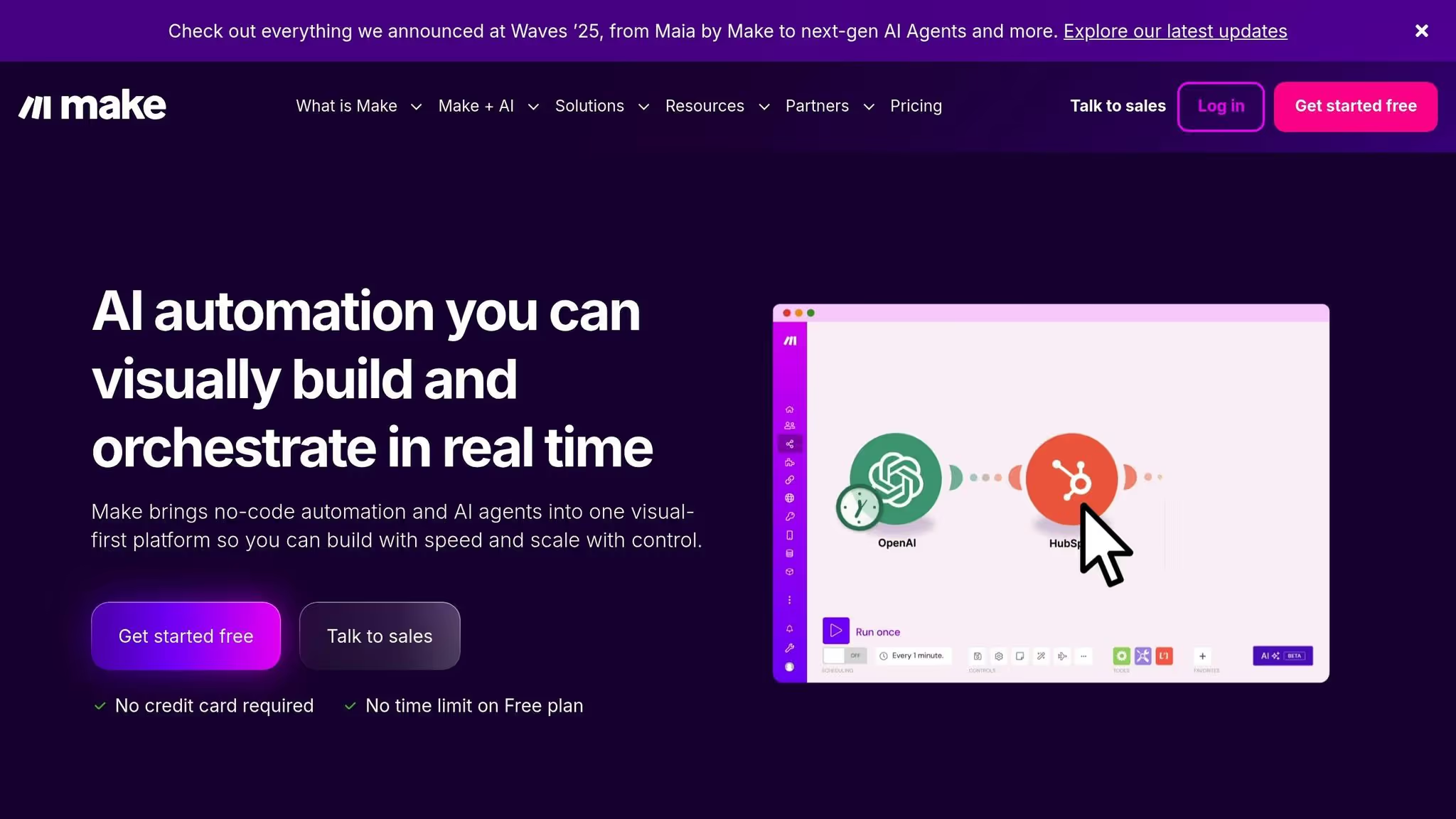
Make 是一个自动化平台,旨在简化工作流程,同时确保强大的数据保护。它采用先进的安全协议,在自动化过程中保持敏感信息的安全,遵守行业标准。通过将无缝自动化与高度重视安全性相结合,Make在人工智能工作流程领域脱颖而出,成为一个可靠的选择。
人工智能工作流程平台有其自身的优势和挑战,尤其是在互操作性、安全性、成本透明度和可扩展性等领域。了解每个平台在这些领域的表现可以帮助组织为其自动化目标选择正确的解决方案。以下是概述,可帮助您权衡利弊并使平台功能与业务需求保持一致。
Prompts.ai 其透明的即用即付TOKN信用系统脱颖而出,该系统消除了经常性订阅费。它还提供企业级安全性,并与35多种领先的语言模型无缝集成,提供出色的互操作性。但是,由于它专注于人工智能编排,因此非人工智能工作流程可能需要额外的集成。
ServiceNo 具有高度可扩展性并提供企业级安全性,使其成为具有复杂IT服务管理要求的大型组织的绝佳选择。它包括全面的审计跟踪,以满足合规标准。但是,其总实施成本可能是不可预测的,从而使预算规划变得复杂。
UiPath 专门研究机器人流程自动化 (RPA),为重复任务提供可扩展性,并提供可视化工作流程设计器,可简化团队的采用。尽管它集成良好,但其许可成本可能会变得复杂,安全性需要对敏感数据进行仔细配置。
Workato 凭借其用于常用业务应用程序的大量预建连接器库,在互操作性方面表现出色。这加快了集成项目并减少了对自定义解决方案的依赖。它适用于中端市场公司,但可能难以应对高度复杂的企业环境。虽然其安全功能符合行业标准,但其基于使用量的定价可能会给成本透明度带来挑战。
扎皮尔 以其简单和快速部署而闻名,使其成为中小型企业的最爱。与许多企业平台相比,其直观的定价提供了更好的成本透明度。但是,它缺乏复杂工作流程的可扩展性,可能无法满足处理敏感数据的企业的安全需求。
制作 提供强大的安全协议和强大的自动化功能,使其对优先考虑数据保护的组织具有吸引力。它通过其连接器生态系统提供合理的互操作性,并为大多数用例提供明确的定价。也就是说,对于需要大量定制或管理大量工作流程的企业来说,可扩展性可能会成为一个问题。
选择正确的平台取决于您组织的特定需求。专注于 AI 工作流程的企业将受益于 Prompts.ai,这要归功于其全面的模型访问和成本效益。具有复杂 IT 需求的大型企业通常会选择 ServiceNo,尽管成本更高。为了自动执行重复任务, UiPath 是一个引人注目的选择,而 Workato 吸引那些寻求快速可靠整合的人。
注重安全的组织可能倾向于 制作,但应考虑其可扩展性限制。同时,预算有限的小型企业通常一开始就是 扎皮尔 因为其价格实惠,但它们最终可能会超出其能力。通过使平台功能与您的优先事项保持一致,您可以确保更顺利地集成到您的自动化策略中。
选择正确的人工智能工作流程解决方案取决于您的特定需求、预算和技术优先事项。在研究了可用的顶级平台之后,出现了一些明显的趋势,这有助于美国企业确定最适合其独特要求的平台。
每个平台都满足特定的运营需求。对于注重成本透明度和 AI 模型多样性的企业, Prompts.ai 脱颖而出,成为强有力的竞争者。另一方面,那些需要更广泛集成能力的平台可能会发现其他平台更合适。通过评估互操作性、安全性、成本可预测性和可扩展性等因素,美国企业可以放心地选择符合其自动化目标并支持长期增长的人工智能工作流程解决方案。
Prompts.ai 非常重视通过遵守以下规定来保护您的数据安全 SOC 2 类型 II, 你好,以及 GDPR 标准。这些协议旨在为敏感信息建立严格的保护。
为确保持续的安全性和合规性,Prompts.ai 与 Vanta 密切合作,Vanta 为其控制提供实时监控。此外, SOC 2 类型 II 审计过程正式开始于 2025 年 6 月 19 日,凸显了他们致力于维护顶级行业惯例。
这个 即用即付 TOKN 积分系统 提供了一种灵活的成本管理方式,让您仅按实际用量付费。由于没有经常性费用或长期承诺,对于使用模式不断变化的企业来说,这是一个明智的选择。
这个系统让你负责你的支出。您可以轻松调整使用量(根据需要扩大或缩小使用量),而不必担心隐性费用。这是一种简单、透明的解决方案,旨在使事情变得方便且具有成本效益。
Prompts.ai 专为毫不费力地与各种企业软件配合使用而设计,可确保您的运营顺畅兼容并提高自动化程度。它与CRM、ERP和项目管理平台等基本工具相连接,使企业无需更换当前系统即可增强工作流程。
例如,各公司利用 Prompts.ai 将其链接到他们的 CRM 来转变客户支持流程。这种集成加快了响应时间并提高了客户满意度。同样,将 Prompts.ai 与 ERP 系统连接有助于简化供应链管理,最大限度地减少人工错误并提高整体效率。这些集成是为应对独特的业务挑战而定制的,为各种行业提供适应性强的解决方案。


